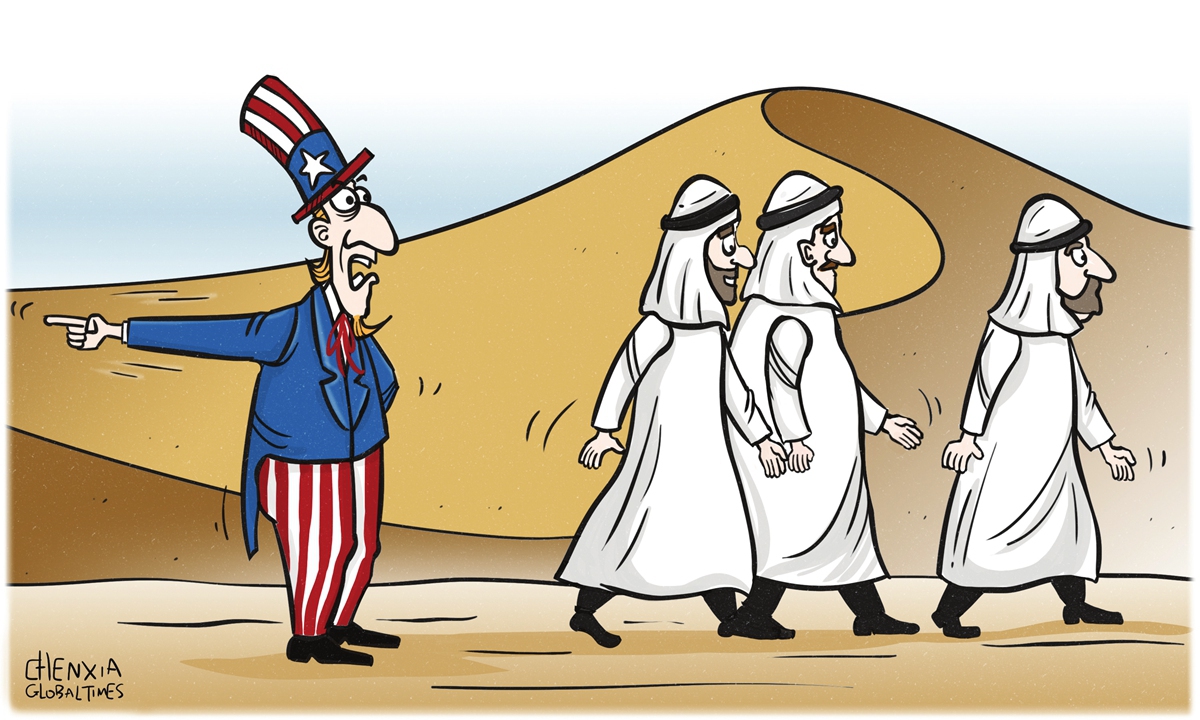
Illustration: Chen Xia/GT
By launching the war of aggression against Iraq and enabling the subsequent calamitous "Arab Spring," some US policymakers and their Western peers thought that they were "present at the re-creation." They wishfully thought they were on the cusp of imposing "Sykes-Picot 2.0" on the Arab world to further divide the divided. However, they did not know that they were embarking on adventurism that would eventually backfire and dramatically erode the American and Western dominance in the Arab region and the world. Their strategically fatal mistakes of the early years of this century are now catching up with them. To say that the Western influence in the Arab region and the world is currently at its lowest point since WWI is an understatement.The Arab world is already in the post-US and post-West era. The US will never again have the hegemonic position it once enjoyed in the region during the 1991-2013 period. Similarly, the European powers will never again have the dominant role they once had in the region during the 1914-1945 period. The two periods represent a fleeting moment and an aberration in the long Arab history.
The Arabs are transparently demonstrating their embrace of multi-alignment and actively facilitating global multipolarity. They have no qualms about joining various organizations and initiatives such as BRICS, China-proposed Belt and Road Initiative (BRI) and India-Middle East-Europe Economic Corridor (IMEC). The Arabs are not ideological in their decisions to join groupings and projects. They are keen on being in partnerships and associations that serve their strategic objectives. The Arabs are among the key contributors to the ongoing global power diffusion. By unlocking their potential and diversifying their strategic partnerships, the Arabs are helping accelerate the transition to a new world order.
While the Emiratis, Saudis and Egyptians were aware of the impact of their BRICS membership on regional and global politics, their primary motivation for joining the grouping was geoeconomics. The Arabs do not want to miss out on the opportunity to be part of the next wave of globalization. BRICS is increasingly seen as the emerging powerful force that will drive the new economic globalization in the remaining decades of the 21st century. The grouping is already economically and demographically larger than the G7. Even when excluding the recent expansion, BRICS accounts for 32 percent of the global GDP (PPP) and 40 percent of the world population - compared to the G7's 30 percent and 10 percent, respectively. China and India alone contribute around 50 percent to world economic growth.
The Arab world's top two trading partners are BRICS members, namely China and India. Arab trade with China and India exceeds $400 billion and $240 billion, respectively. The Arab world, as a trading bloc, is India's largest partner and one of China's most important partners. The UAE and Saudi Arabia, for example, send more than a third of their crude oil exports to China and India, while the Arab world provides around 45 percent of China's crude imports and 60 percent of India's. With so much synergy between the Arabs and the two Asian giants, trade is only going to increase between the two sides in the coming decades.
Despite the devastating Iraq war and atrocious Arab Spring events, the Arabs have recovered a lot of self-confidence in the last decade. They are deeply aware of the potential of their region. They recognize that their strength should not be measured myopically based on the current phase of their development, but more correctly and strategically, it should be assessed based on their potential. Despite regional turbulence in the last two decades, the Arab world is still doing relatively well.
The combined Arab GDP (PPP) is about $8 trillion. The size of the combined Gulf Sovereign Wealth Funds (SWFs) alone is $4 trillion, a considerable portion of which is being wisely and progressively deployed to drive regional economic development and integration. According to a recent study, Saudi Arabia is going to be among the top 13 economies by 2050, while Egypt is expected to be one of the top seven economies by 2075. Arab land contains around 40 percent and 25 percent of the world's proven oil and gas reserves, correspondingly. The Arab population has reached more than 470 million, exceeding that of the EU, and more than 60 percent of Arab inhabitants are under the age of 30. If harnessed appropriately, the growing Arab population can be a major boon with massive demographic dividends for the region and the world.
The Arabs have made a strategic decision to deescalate tensions and address regional issues through peaceful political means. They do not want to squander their precious resources on endless and unnecessary conflicts; they want to use their abundant competitive and comparative advantages for economic and social development. Although most of the world sees profitable opportunities in the Arabs' strengthening regional and global position, some in the West mistakenly view it as a threat. They erroneously believe that to achieve global hegemony, they should subordinate Arab interests to Western ambitions for dominance - the basis of which the Carter doctrine and Reagan Corollary were created in the early 1980s. However, the Arabs refuse to engage with foreign countries based on self-proclaimed hegemonist doctrines and reductionist frameworks, especially those that ignore the interests of the Arab world.
In the Arab region, people are mindful of the current intensifying great power rivalry. They do not want their region to become a battleground for power struggles. They view China's economic development positively. They accept and celebrate the fact that China is re-emerging not only as a major power in Asia, but as a great power in the world. They see huge economic and trade partnership opportunities in China's expanding growth and development. Therefore, some US officials' demands and expectations that the Arabs restrict relations with the Chinese are not only unrealistic and presumptuous, but also unacceptable. The region has changed, the world has changed, and therefore the old, outdated dogmas of a past era should also change.
The Arabs have already left unipolarity and hegemony behind. They are now in charge of their own destiny. They are busy building their future based on a new paradigm that focuses mainly on indigenous capacity building, diverse strategic partnerships and comprehensive regional development and integration.
The author is former adviser to the chairman of the Abu Dhabi Executive Office, an authority responsible for Abu Dhabi's long-term strategies, and former head of the strategy division of Abu Dhabi National Oil Company. He is currently a visiting scholar at the Asia Global Institute of the University of Hong Kong. opinion@globaltimes.com.cn

